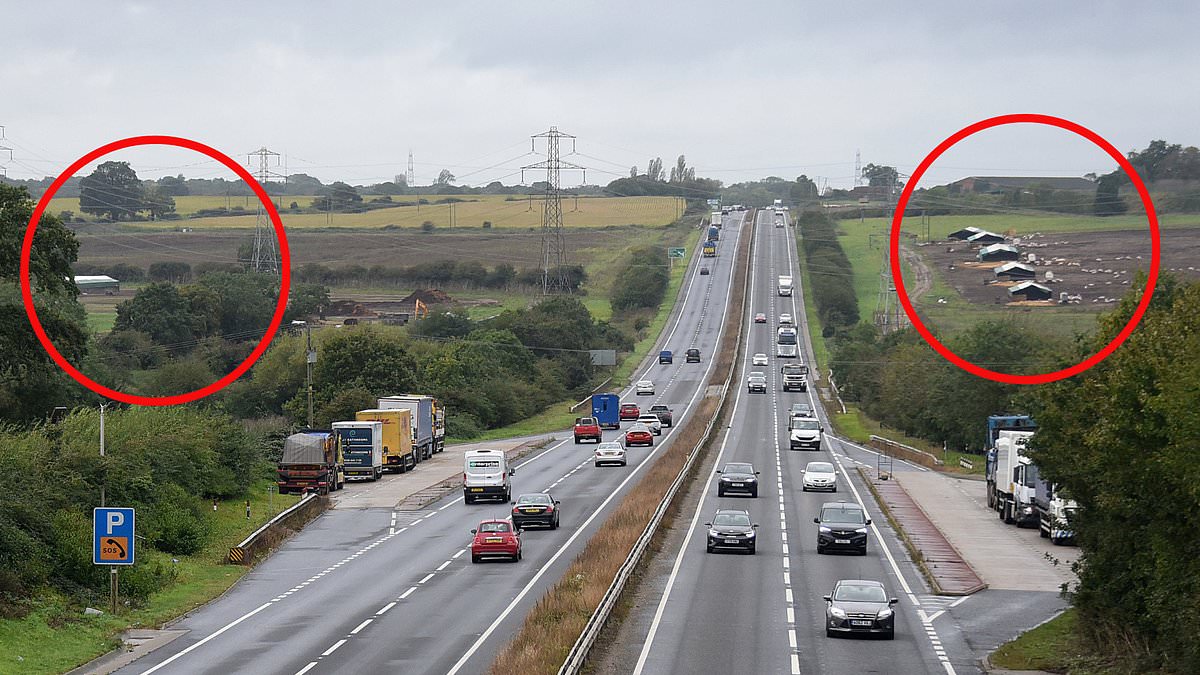A farmer has been paid almost £1.5million of public money to stop rearing pigs in the first deal of its kind to meet controversial environmental rules.
Under a directive issued last year, local authorities are obliged to find ways to ‘offset’ the impact of pollution on waterways caused by new developments.
So-called ‘nutrient neutrality’ was hailed by environmentalists who argued it would limit the amount of damaging substances in rivers and lakes, such as nitrogen and phosphorous.
The government attempted to stop the ‘reckless’ plan, arguing it would hold up much needed housebuilding but it was forced through the House of Lords by Labour and Lib Dem peers.
The huge deal in Norfolk has now raised concerns that farmers elsewhere will be paid to effectively sit on their hands, while the UK’s food security – the amount of homegrown produce available for our tables – will be further weakened.
A covenant is to stop James Daniels pig farming on his land which sits by the A47 bypass south of Norwich
Markshall Farm, which sits by the A47 bypass south of Norwich, rears up to 2,000 pigs every year, producing nutrients that run into two nearby rivers.
Closing it down will allow planning officials to give permission for 5,000 properties throughout the county.
Owner James Daniels told the Mail people thought he was receiving an ‘obscene amount of money’ for ‘quitting’ his job but he insisted he was ‘doing everyone a favour’ by helping the environment.
He said: ‘It really makes me angry when people say I’m profiting from this. It’s compensation for giving everything up.
‘I’m the second generation of my family on this farm after my father got it in 1950. My son wanted to take it over.’
Covenants will limit Mr Daniels, 66, to using the land for arable crops, hay, or sowing it with grass seed or wildflowers.
He added it would become a haven for nature, saying: ‘The money… is only going to pay me for eight to ten years worth of putting pigs on there. That was my living.’
But independent South Norfolk councillor Clayton Hudson said: ‘My concern is about openness and transparency, with this potential use of public money.
‘And I’m not sure stopping a pig farmer from putting nutrients in the system only to replace that with more development solves the issue.’
Markshall Farm rears up to 2,000 pigs every year, producing nutrients that run into two nearby rivers
Mr Daniels will be compensated by Norfolk Environmental Credits Ltd, a joint business venture between Norfolk councils and Anglian Water.
The local authorities are borrowing millions to lend to the company for the mitigation schemes. Developers will buy ‘credits’ from NEC to offset nutrients created by the house building schemes. Council chiefs claim this will cover their outlay.
Phil Courtier, director of place at Broadland and South Norfolk District Councils, said: ‘We are on the cusp of finalising a deal that will be the first of its kind in the country to release a significant number of homes and improve the environmental quality of the [Norfolk] Broads and the river Wensum.’
South Norfolk Council leader John Fuller and Breckland District Council counterpart Sam Chapman-Allen previously criticised the offsetting scheme, claiming it was putting 41,000 homes on hold across the county.
Mr Fuller added it meant organisations like Defra, Natural England and water companies were able to avoid doing their job to clean up rivers and instead could ‘pass the buck to councils, which lack the powers, responsibility and enforcement powers to do so’.
But Gareth Dalglish, Norfolk Wildlife Trust’s director of nature recovery, said: ‘Any weakening of environmental protections would have a devastating effect on our Norfolk rivers, streams and wildlife – already under huge pressure from sewage and farm pollution.’
And Green county councillor Jamie Osborn added: ‘We need better regulation to prevent the dumping of toxic waste into our rivers, not a free pass for developers to pollute then even more.’
The fields will no longer be used for pig farming under the terms of the deal
The Government’s plans to axe ‘nutrient neutrality’ rules in protected areas – which were set out in a directive from Natural England in March 2022 – were announced by Prime Minister Rishi Sunak during a visit to Norfolk with local government secretary Michael Gove in August.
But the House of Lords voted 192 to 161 against scrapping them last month. Labour and Lib Dem peers were joined by three Tory peers to block the move.
The Government plans to revive its attempt to get rid of the rules but will not have time in this Parliament.
Official figures last year showed the UK imports 46 per cent of the food it consumes.
Nutrient neutrality was brought in under EU planning rules. Natural England issued a directive last year which stated that housebuilding could not proceed in 27 catchment areas across England unless offsetting was put in place.
The Government’s attempt to ditch the scheme was prevented by the Lords vote.
Liberal Democrat Housing, Communities and Local Government spokesperson, Helen Morgan said: ‘The Conservatives have had since 2018 to fix the problems with nutrient neutrality. Instead of getting a plan in place they sat on their hands and then tried to water down our environment protections, which Liberal Democrats opposed.
‘Liberal Democrats want to see more homes built and our rivers saved from pollution. Schemes like this have their part to play but they must be done to ensure that food security is not affected while unlocking the homes we desperately need.’
A Labour Party source said: ‘We stand by our decision to vote against the [Government] proposal because it was a flawed proposal.’
